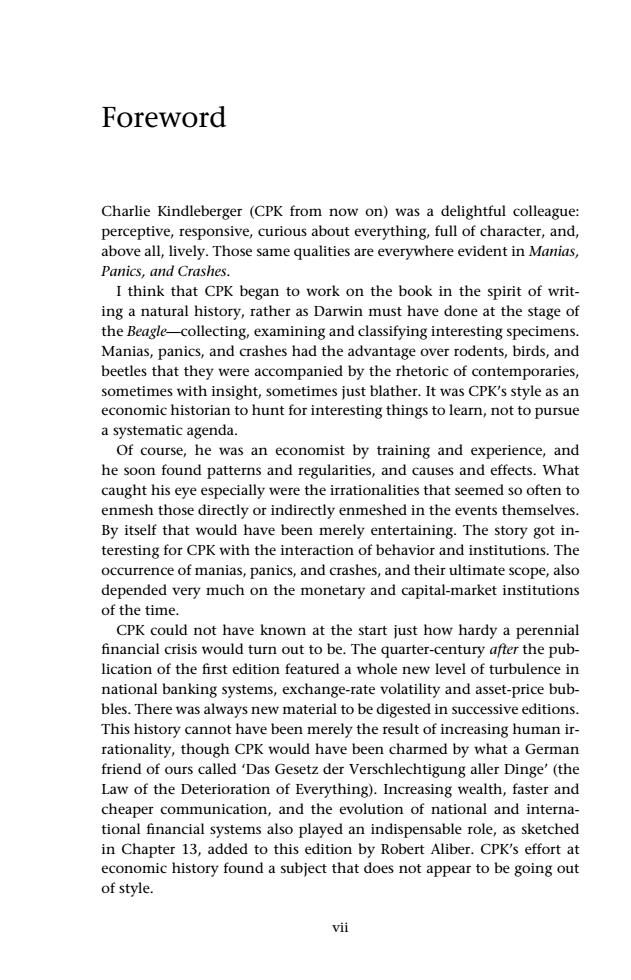正在加载图片...

Foreword Charlie Kindleberger(CPK from now on)was a delightful colleague: perceptive,responsive,curious about everything,full of character,and above all,lively.Those same qualities are everywhere evident in Manias, Panics.and Crashes. I think that CPK began to work on the book in the spirit of writ ing a natural history,rather as Darwin must have done at the stage of the Beagle-collecting,examining and classifying interesting specimens. Manias,panics,and crashes had the advantage over rodents,birds,and beetles that they were accompanied by the rhetoric of contemporaries, sometimes with insight,sometimes just blather.It was CPK's style as an economic historian to hunt for interesting things to learn,not to pursue a systematic agenda. of course,he was an economist by training and experience,and he soon found patterns and regularities,and causes and effects.What caught his eye especially were the irrationalities that seemed so often to enmesh those directly or indirectly enmeshed in the events themselves. By itself that would have been merely entertaining.The story got in- teresting for CPK with the interaction of behavior and institutions.The occurrence of manias,panics,and crashes,and their ultimate scope,also depended very much on the monetary and capital-market institutions of the time. CPK could not have known at the start just how hardy a perennial financial crisis would turn out to be.The quarter-century after the pub- lication of the first edition featured a whole new level of turbulence in national banking systems,exchange-rate volatility and asset-price bub- bles.There was always new material to be digested in successive editions This history cannot have been merely the result of increasing human ir- rationality,though CPK would have been charmed by what a German friend of ours called 'Das Gesetz der Verschlechtigung aller Dinge'(the Law of the Deterioration of Everything).Increasing wealth,faster and cheaper communication,and the evolution of national and interna tional financial systems also played an indispensable role,as sketched in Chapter 13,added to this edition by Robert Aliber.CPK's effort at economic history found a subject that does not appear to be going out of style.FM JWBK120/Kindleberger February 13, 2008 14:53 Char Count= Foreword Charlie Kindleberger (CPK from now on) was a delightful colleague: perceptive, responsive, curious about everything, full of character, and, above all, lively. Those same qualities are everywhere evident in Manias, Panics, and Crashes. I think that CPK began to work on the book in the spirit of writing a natural history, rather as Darwin must have done at the stage of the Beagle—collecting, examining and classifying interesting specimens. Manias, panics, and crashes had the advantage over rodents, birds, and beetles that they were accompanied by the rhetoric of contemporaries, sometimes with insight, sometimes just blather. It was CPK’s style as an economic historian to hunt for interesting things to learn, not to pursue a systematic agenda. Of course, he was an economist by training and experience, and he soon found patterns and regularities, and causes and effects. What caught his eye especially were the irrationalities that seemed so often to enmesh those directly or indirectly enmeshed in the events themselves. By itself that would have been merely entertaining. The story got interesting for CPK with the interaction of behavior and institutions. The occurrence of manias, panics, and crashes, and their ultimate scope, also depended very much on the monetary and capital-market institutions of the time. CPK could not have known at the start just how hardy a perennial financial crisis would turn out to be. The quarter-century after the publication of the first edition featured a whole new level of turbulence in national banking systems, exchange-rate volatility and asset-price bubbles. There was always new material to be digested in successive editions. This history cannot have been merely the result of increasing human irrationality, though CPK would have been charmed by what a German friend of ours called ‘Das Gesetz der Verschlechtigung aller Dinge’ (the Law of the Deterioration of Everything). Increasing wealth, faster and cheaper communication, and the evolution of national and international financial systems also played an indispensable role, as sketched in Chapter 13, added to this edition by Robert Aliber. CPK’s effort at economic history found a subject that does not appear to be going out of style. vii